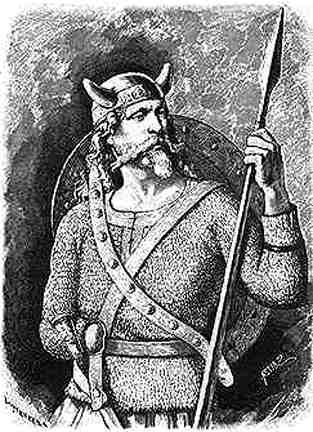
Tyr
Tyr :: The Norse God of War and Justice
Tyr - The Norse God of War and Justice
Tyr (pronounced like the English word "tier") is one of the oldest and most revered gods of the Norse and Germanic peoples. He is associated with war, law and justice, and is known for his courage and sacrifice. He was once the leader of the Aesir, the tribe of gods that ruled over Asgard, but was later replaced by Odin as the supreme god.
The Origin and Meaning of Tyr
Tyr's name comes from the Proto-Germanic word *Tiwaz, which means "god" or "sky god". The Romans identified Tyr with Mars, their god of war, and the day of the week Tuesday is named after him (from Old English Tiwesdæg, meaning "Tiw's day"). Tyr is also connected to the Tiwaz rune, which symbolizes justice, honor, leadership and self-sacrifice.
The Myth of Tyr and Fenrir
The most famous myth involving Tyr is the binding of Fenrir, the monstrous wolf son of Loki. The gods feared that Fenrir would grow too powerful and cause havoc in the world, so they decided to chain him up. However, Fenrir was cunning and strong, and he broke every chain they tried to use. Finally, the gods asked the dwarves to forge a magical ribbon called Gleipnir, which was made of six impossible things: the sound of a cat's footfall, the beard of a woman, the roots of a mountain, the sinews of a bear, the breath of a fish, and the spittle of a bird.
The gods tricked Fenrir into trying the ribbon, but he sensed their deception and refused to let them tie him up unless one of them put their hand in his mouth as a pledge of good faith. None of the gods dared to do this, except for Tyr, who was the bravest and most honorable of them all. He placed his right hand in Fenrir's mouth, and the gods quickly bound the wolf with Gleipnir. When Fenrir realized he was trapped, he bit off Tyr's hand, leaving him with only a stump. Tyr did not regret his sacrifice, for he knew he had saved the world from a great evil. He is still honored as the god who gave his hand for the greater good.
The Role and Worship of Tyr
Tyr was not only the god of war, but also the god of law and justice. He presided over matters of treaties, oaths, contracts, and legal disputes. He was also the god of the thing, the assembly of free men where laws were made and cases were judged. Tyr was respected and revered by the Norse and Germanic peoples, especially by warriors and rulers who sought his favor and guidance. He was invoked for victory in battle, for fair and righteous judgment, and for courage and loyalty. Tyr was also associated with the sky, the sun, and the stars, and some scholars have suggested that he was originally a sky god or a solar deity.
Tyr Video
Tyr Q&A
Link/Cite Tyr Page
Written by: The Editors of GreekMythology.com. GreekMythology.com editors write, review and revise subject areas in which they have extensive knowledge based on their working experience or advanced studies.
For MLA style citation use: GreekMythology.com, The Editors of Website. "Tyr". GreekMythology.com Website, 30 Nov. 2023, https://www.greekmythology.com/Myths/Norse/Tyr/tyr.html. Accessed 24 April 2024.
